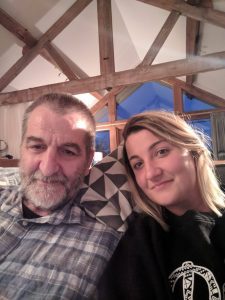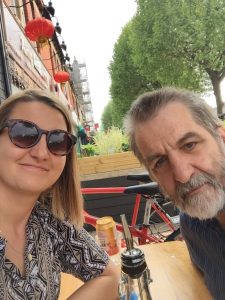27th Sep 2021 - Written by Katy Westaway
Reading time: 3 minutes
To commemorate World Alzheimer’s Month, Tessa, 31, is sharing her story with Brunelcare. Her father, Andy, was diagnosed with Frontal Lobe Dementia in 2014, at just 64-years-old. He is now living at Saffron Gardens, where he receives full-time care from carers and nurses. Tessa wanted to share her story to offer advice, encouragement and tell her version of what it’s like loving, and taking care of someone living with dementia.
“My dad has always been really eccentric and quirky, he’s always been a busy person and he was always doing something. He owned his own water sports shop in Ashton and he owned a couple of buy-to-let properties around Bristol. When I first noticed Dad becoming unwell he was just 64-years-old. I visited him at his shop where there was a hand written sign that said, ‘cash only’, my dad informed me that the card machine had broken, but later admitted to me that he didn’t know how to use it. I thought this was strange, as Dad had owned the shop for over 25-years, managing daily card transactions.”
Andy would also get confused by shoe sizes in his shop and become very easily stressed and anxious, a common side effect of someone living with dementia. Helpful neighbours told Tessa her dad was leaving his shop door open during closing hours and the safety of his driving became a concern. The then unknown Frontal Lobe Dementia was becoming very risky to Andy’s daily routine.
Tessa noticed these changes happening very quickly and sought a doctor’s advice. Tessa and her brother Joshua were told that their dad had suffered a mini stroke, and his ‘forgetfulness’ and ‘confusion’ was as a result of the stroke. Not agreeing with the diagnosis, Tessa decided to send her father to a private memory clinic. Despite having life-long health insurance, they were only willing to conduct an initial assessment and refused any further support under the grounds his insurance did not cover ‘mental health issues’.
“We managed to get an appointment at another memory clinic where he was made to do simple activities to test his cognitive ability and general mental health. The results came back as Dad having Frontal Lobe Dementia, a type of dementia that occurs when nerve cells in the frontal and temporal lobes of the brain are lost. As a family we were devastated, but also felt relieved we had finally had a diagnosis and could start seeking the right support.”
This diagnosis resulted in Andy having his driving license taken away. He could no longer pop to the shops, he couldn’t go sailing or visit friends and family. Tessa explains how he felt like he had lost his identity and his freedom.
“We tried to explain to Dad that he has Frontal Lobe Dementia, however he wasn’t willing to accept the diagnosis. He was upset and angry and we often bore the brunt of his frustration. Looking back now I understand how scary it must have been for him and wish I’d been able to show him more compassion. As a next step we were assigned a Dementia Navigator who tried to help signpost us to activities and home care for dad. As he was young, fit and able, it was hard to find activities which he would enjoy and carers who would be good company and allow him to keep his pride.

We finally met Shelley, a home carer who offered dad friendly companionship as well as
administering medication and making sure he’d washed and eaten. Dad enjoyed her company and she kept him entertained whilst we were at work. She was our first ‘angel’ in the journey, and we learnt how important finding good people in the system would become.”
By this stage, Tessa had moved her dad to one of his buy-to-let properties so he could live closer to her. She soon realised his needs were quickly becoming higher and leaving him alone for any period of time was risky. In doing this, the family recognised the urgency of him needing more than home care – he needed a care home.
“Dad would knock on my door several times in the day and also throughout the night too. He didn’t understand why he was living in that particular property and felt very confused. With the whole family working full-time jobs and his behavior becoming too difficult to manage, we soon realised that Dad needed full-time care.”
Meanwhile, as the dementia progressed, Andy was becoming increasingly frustrated, angry and volatile. It was decided for his own safety that he would be admitted to Callington Road hospital to help get his medication right.
Alongside looking for care homes for her dad, Tessa also had to close down her dad’s shop, sell his properties, apply to be his power of attorney and try to access bank accounts and stop direct debit payments.
“There was so much going on and so much I had to deal with. I didn’t have the time to stop and think about anything else apart from sorting out the practical arrangements to keep him safe and his affairs in order. I didn’t even deal with the emotional side of losing my dad to a disease that he’ll never recover from.”
Tessa set out to find a care home for her father to live in. After looking at several care homes in the Bristol area, Tessa and her family eventually found Brunelcare’s Saffron Gardens.
“As soon as we walked into Saffron Gardens we knew this would be the home for Dad. It was full of life, full of colour and the carers seemed lovely! They made my dad feel really special and nothing seemed to phase them. It felt like a real home from home for Dad. The carers are total experts and deeply caring people. We would come and visit Dad and notice the carers stroking his head or holding his hand, they showed my dad real love and support and the carers at Brunelcare taught us some techniques to help Dad feel at ease when we visited him.”
They told us the ‘go with it technique,’ so if Dad had a sailing event to get to, we would go along with it. It’s a great technique and we’ve had some very interesting and funny conversations with Dad! When people say what happened to my dad is ‘terrible,’ I sometimes think it’s amazing. It’s brought us together as a family and with Dad living somewhere he is safe we could finally spend quality time as a family again. One of the invaluable lessons I learnt from his dementia was how to show unconditional love, in the face of Dad’s bizarre and sometimes challenging behavior, we learnt to show him kindness and make light of difficult situations.”
Now 71, Andy is living at our Saffron Gardens care home and Tessa visits her father twice or three times a week. She says her journey of caring for someone living with dementia has been emotionally tough, but her dad’s illness has actually brought the family closer together.
“If you’re caring for someone living with dementia, I’d offer three pieces of advice. Firstly, ‘just go with it,’ whilst it might feel strange to agree with some of their delusions, it also makes the person feel calm, understood and builds a trusting relationship. Secondly, get the important practical affairs such as power of attorney and financial affairs sorted as early as possible, allowing you more quality time with your loved one as time goes on. Thirdly, look for the angels, a piece of advice given to us in the early stages – there are some amazing people out there who want to help, both professionals and friends. Don’t be ashamed to take their offers of help and hang on tight when you find a good one.”